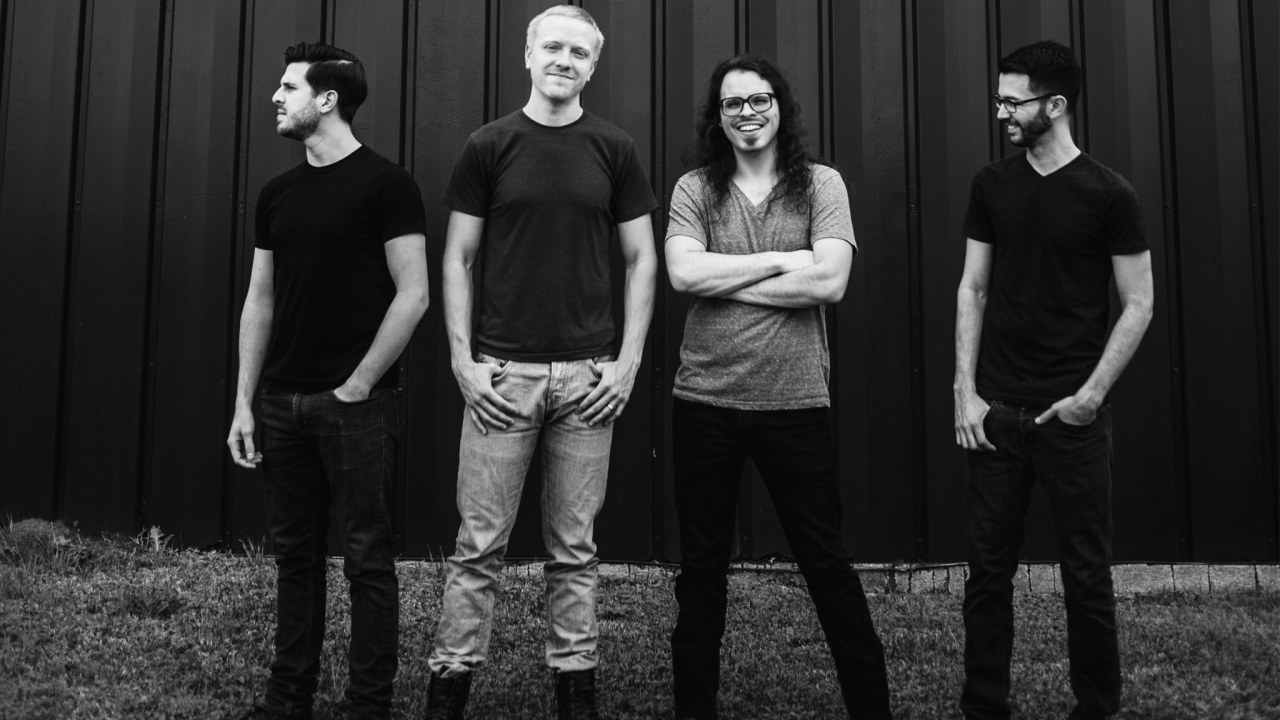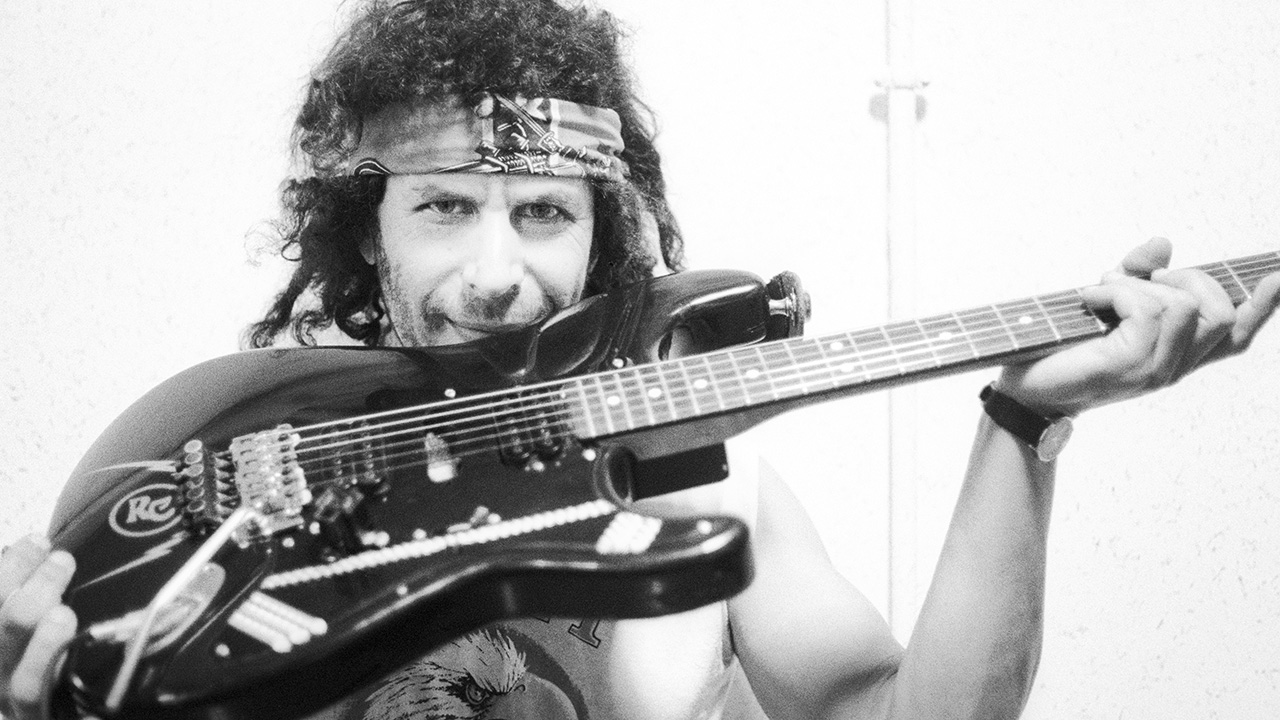“There are no rules!" Texan prog metallers Scale The Summit Reach New Heights On V
Despite departing drummers and geographical challenges, Scale The Summit have hit a new creative peak with fifth album V.

Select the newsletters you’d like to receive. Then, add your email to sign up.
You are now subscribed
Your newsletter sign-up was successful
Want to add more newsletters?

Every Friday
Louder
Louder’s weekly newsletter is jam-packed with the team’s personal highlights from the last seven days, including features, breaking news, reviews and tons of juicy exclusives from the world of alternative music.

Every Friday
Classic Rock
The Classic Rock newsletter is an essential read for the discerning rock fan. Every week we bring you the news, reviews and the very best features and interviews from our extensive archive. Written by rock fans for rock fans.

Every Friday
Metal Hammer
For the last four decades Metal Hammer has been the world’s greatest metal magazine. Created by metalheads for metalheads, ‘Hammer takes you behind the scenes, closer to the action, and nearer to the bands that you love the most.

Every Friday
Prog
The Prog newsletter brings you the very best of Prog Magazine and our website, every Friday. We'll deliver you the very latest news from the Prog universe, informative features and archive material from Prog’s impressive vault.
On its release in 2013, Scale The Summit’s The Migration offered the most complete realisation of the band’s creative vision, a work of virtuoso playing executed with nuance and emotion. Now, two years later, they’re back with the appropriately titled V, pronounced “Roman Numeral Five”, according to their tongue-in-cheek new video for Stolas.
V is still recognisably Scale The Summit but it pushes the band further into new territory. “It’s kind of a landmark point,” says bassist Mark Michell. “I know every artist says, ‘This is our best, most balanced record yet,’ and I’m guilty of saying that right now, but when I first got some of the music I was like, ‘Wow.’ The word ‘grandiose’ comes to mind.”
The Texan band have argued in the past that not having vocals gives them freedom from genre pigeonholing and the ability to play loud guitar music without alienating non-metal fans. “Chris [Letchford, guitarist] always says a gain knob on an amp can’t really determine your genre. Most bands are classified by their vocalist. Screaming? Okay, this is the scene you belong in. Clean, operatic vocals? Okay, you’re in this one. Take that away and it’s like, you can’t really put this anywhere.”
Though the new album undoubtedly leans heavily both on the classic progressive metal of Dream Theater and modern technical metal, it’s more nuanced than ever before, drawing on a broader set of influences and exhibiting a stronger grasp of dynamics. More than that, like many an album by a band that’s come of age, it’s that old music journalist cliché – more mature – than previous efforts.
For their own part, Michell and founding guitarist Travis LeVrier are happy to talk about the influences of the band, which they say haven’t changed for this album – it’s rather their approach that’s different. “In an instrumental band there are no rules,” says LeVrier. “You can do anything that comes to mind, or anything you’re inspired to write. Personally, growing up, I’ve always had a thing for instrumental music. My dad showed me Surfing With The Alien by Joe Satriani when I was 10 years old or something, and it just blew my mind. Ever since then, I think it was subconscious at first, but I’ve always enjoyed listening to instrumental music, whether it be somebody like Satriani or something else entirely different.”
Chris Letchford has previously explained how he doesn’t listen to much music while he’s composing for Scale The Summit as he wants as few outside influences as possible to seep in. So it stands to reason that the changes in the band’s sound are either deliberate, or born of experience and age. Having joined the group in 2012, and been a fan previously, Mark Michell is in an interesting position and says he can offer a more “objective” take on everything.
Playing on stage is like riding a roller coaster at an amusement park – you’re waiting in line two hours for that 10-second drop.
Sign up below to get the latest from Prog, plus exclusive special offers, direct to your inbox!
“Coming into the band, I have a different perspective on how it’s progressed over the years,” he says. “If I had to sum it all up, you listen to [2007 debut album] Monument, it’s focused only in one dimension, though not in one direction. It’s an awesome album, and the first Scale album I heard. But then you go to [2009’s] Carving Desert Canyons and [2011’s] The Collective it slowly becomes more dynamic. I think the best way to describe it is to look at a scale where one end is complete technical shred and in your face and the other end is really mellow. You then picture brackets, like parentheses, around the scale, and they keep widening. For this album, they’re the furthest apart yet. I think there’s some of the shreddiest stuff – really crazy things in some parts of songs – but then you have low-gain stuff that’s more like The Collective. I think of dynamics and groove and restraint, but also crazy, technical stuff, when I think about this album.”
Both line-up changes and changes in the band members’ personal situations resulted in a shake-up for Scale The Summit before the recording of V. “I don’t think his heart was really in it much anymore,” says LeVrier, explaining their amicable split with original drummer Pat Skeffington. “That was something that was hard for all of us to acknowledge and then move on from. We’re still on good terms, but like I said, I don’t think his heart was in it.”
Scale The Summit were formed when Letchford and LeVrier moved from Texas to Los Angeles to attend the Musicians Institute. There they met Jordan Eberhardt and Skeffington, whom they convinced to return to Houston to continue the band once their studies were over. Now the childhood friends are the only founding members remaining, and the band – except LeVrier – are no longer based in Houston, making the logistics that bit more difficult.
“In the past we’ve always got all four together,” says LeVrier, “and gone to a certain studio and holed up there for about three weeks or so and just banged it out. Just work on it every day until we’re done and that’s generally the only way we’ve been able to do things.”
In lieu of regular band practices, the band now have to settle for more concentrated periods of work, “meeting up before a tour to rehearse the material for maybe a week and a half”, says LeVrier, before explaining how the new album was recorded piecemeal.
“I ended up flying up to Colorado – which is where Chris moved to – and tracked the guitars just ourselves with our touring sound engineer, then he went to Louisiana to track the bass with Mark the same way. Then we did the drums in Houston.”
When Guitar Hero came out, you got kids super-interested in the technicality of guitars. Fast-forward a few years and you’ve got this whole prog scene.
The only time the band were all in one place was during the drum recording, as new drummer JC Bryant laid down his parts. Michell notes some key differences to the session. “We were all in Houston, producing him through the drum tracks. There was a sense of spontaneity to the drums; they were a lot less preconceived.”
In the studio for V, Bryant’s contributions were more free-form as a result of the short notice, and he often had little time to prepare. “As we had a line-up change, there were a lot of on-the-fly contributions, with everyone chiming in with what they thought might work right here,” says LeVrier. “JC really stepped up to the plate, got in there and experimented and pretty much would play exactly what we would suggest while putting his own spin on it. It was pretty cool to watch.”
Another thing the band are well known for is teaching. Chris Letchford has published four guitar tuition books and Mark Michell has just launched his own online bass tuition course, Low End University. “But Travis has more students than all of us!” laughs Michell.
LeVrier, who teaches guitar in Los Angeles, murmurs deferentially. “Right when I joined, Chris and Travis urged me to teach,” continues Michell, “and I started doing that pretty quick, because joining a band like Scale The Summit, there was a demand for lessons pretty quickly. It was great.”
Michell has a theory as to why it’s so common for musicians of a certain stripe to teach as well. “When Guitar Hero [the music videogame] came out, you got kids super-interested in the technicality of guitars. Fast-forward a few years and this whole prog scene has created a side-industry of musicianship and wanting to learn music. There’s this new market for musicians like us. People love your technical ability and they want to learn from you.”
Moreover, LeVrier points out, “It grants you a little bit of freedom because you don’t have to come home from tour and get a normal nine-to-five job. It’s also inspiring. I wouldn’t want to be doing anything else for work.”
Despite the shake-ups over the last couple of years, Scale The Summit’s enthusiasm and drive haven’t dimmed. When Prog asks them what it is they love about music, and how they have the motivation to continue in a band that’s spread across a continent, Michell and LeVrier briefly fall silent.
“Chris and I had the same reaction when we started our last tour,” says LeVrier eventually. “It had been a little while since we’d toured, probably about four or five months, but as soon as you step on stage and you hear a crowd scream because they enjoyed the song you just played… We looked over at each other after the set and just went, ‘Man, there’s no other feeling that will give you that right there.’ Those moments are so little compared to all this work, but it’s all worth it. Also being able to say, ‘Ah, man, we worked our ass off on this record and it’s gonna be around forever.’” “I think the neatest part about music that maybe not a lot of people think about is that you’re leaving a legacy when you’re long gone,” says Michell. “It lives forever. Playing on stage is like riding a roller coaster at an amusement park – you’re waiting in line two hours for that 10-second drop. That’s why you keep going back and getting in line.” _ V is out September 18 on Prosthetic Records. See www.scalethesummit.bigcartel.com for more information._
